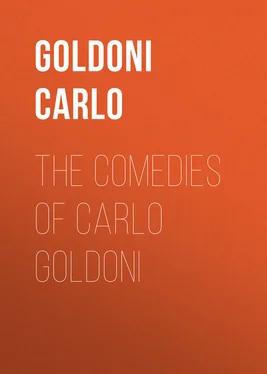Carlo Goldoni - The Comedies of Carlo Goldoni
Здесь есть возможность читать онлайн «Carlo Goldoni - The Comedies of Carlo Goldoni» — ознакомительный отрывок электронной книги совершенно бесплатно, а после прочтения отрывка купить полную версию. В некоторых случаях можно слушать аудио, скачать через торрент в формате fb2 и присутствует краткое содержание. Жанр: foreign_antique, foreign_prose, foreign_dramaturgy, на английском языке. Описание произведения, (предисловие) а так же отзывы посетителей доступны на портале библиотеки ЛибКат.
- Название:The Comedies of Carlo Goldoni
- Автор:
- Жанр:
- Год:неизвестен
- ISBN:нет данных
- Рейтинг книги:5 / 5. Голосов: 1
-
Избранное:Добавить в избранное
- Отзывы:
-
Ваша оценка:
- 100
- 1
- 2
- 3
- 4
- 5
The Comedies of Carlo Goldoni: краткое содержание, описание и аннотация
Предлагаем к чтению аннотацию, описание, краткое содержание или предисловие (зависит от того, что написал сам автор книги «The Comedies of Carlo Goldoni»). Если вы не нашли необходимую информацию о книге — напишите в комментариях, мы постараемся отыскать её.
The Comedies of Carlo Goldoni — читать онлайн ознакомительный отрывок
Ниже представлен текст книги, разбитый по страницам. Система сохранения места последней прочитанной страницы, позволяет с удобством читать онлайн бесплатно книгу «The Comedies of Carlo Goldoni», без необходимости каждый раз заново искать на чём Вы остановились. Поставьте закладку, и сможете в любой момент перейти на страницу, на которой закончили чтение.
Интервал:
Закладка:
At this time in Italy, the so-called Commedie dell' arte or a soggetto held the boards; extremely artificial, stilted forms of dramatic composition, which, it is true, testified to the quick and ready wit of the Italians, but also to a puerile taste, far removed from artistic finish. These plays were all performed by actors in masks, after the manner of the classical drama, and in the greater number of cases the players were supplied merely with the plot and the situations of the play, the dialogue having to be supplied by the invention of the actors themselves; the outline was often of the roughest nature, much after the manner of modern drawing-room charades, but there were certain stock characters, such as an old man who is the butt of the tricks and deceptions of the others, an extravagant son, scampish servants, and corrupt or saucy chambermaids. These characters and their established costumes were derived from different cities of Italy, and were traditional from the earliest appearance of the Commedie dell' arte . Thus, the father, Pantaloon, a Venetian merchant, the doctor, a lawyer or professor from learned Bologna, and Brighella and Harlequin, Bergamasque servants as stupid as the corrupt or saucy maid-servants and lovers from Rome and Tuscany were sharp. Lance and Speed in "Two Gentlemen of Verona" are good specimens of these characters. The merchant and the doctor, called in Italian "the two old men," always wore a mantle. Pantaloon, or Pantaleone, is a corruption of the cry, Plantare il Leone , (Plant the Lion), to the sound of which, and under shadow of their banner, the Lion of their patron St. Mark, the Venetians had conquered their territories and wealth. Pantaloon was the impersonation, however, not of fighting but of trading Venice, and wore the merchant costume still in use, with but slight modification, in Goldoni's day. The dress of the doctor was that of the lawyers of the great university, and the strange mask which was worn by this character imitated a wine-mark which disfigured the countenance of a certain well-known legal luminary, according to a tradition extant among the players in Goldoni's time. Finally, "Brighella and Arlecchino," called in Italy Zanni, 1 1 Jacks; Zanni being a nickname for Giovanni, John.
were taken from Bergamo as the extremes of sharpness or stupidity, the supposed two characteristics of the inhabitants of that city. Brighella represented a meddlesome, waggish, and artful servant, who wore a sort of livery with a dark mask, copied after the tanned skin of the men of that sub-Alpine region. Some actors in this part were called Finocchio, Scappino (Molière's Scapin), but it was always the same character, and always a Bergamasque. Arlecchino, or Harlequin, too, had often different names, but he never changed his birthplace, was always the same fool, and wore the same dress, a coat of different-coloured patches, cobbled together anyhow (hence the patchwork dress of the modern pantomime). The hare's tail which adorned his hat formed in Goldoni's time part of the ordinary costume of the Bergamasque peasants. Pantaloon's disguise was completed by a beard of ridiculous cut, and he always wore slippers. It is in allusion to this that Shakespeare calls the sixth age of man, "the lean and slippered pantaloon."
When Goldoni began to write, the drama had fallen into a sadly burlesque condition. Shortly after the first performance of his "Venetian Gondolier," a play called "Belisario" was represented, in which the blinded hero was led on to the stage by Harlequin, and beaten with a stick to show him the way. This indignity of presentation awoke in Goldoni a desire to write a play on the same theme. Asking the principal actor in this farce, what he thought of it, the man replied, "It is a joke, a making fun of the public, but this sort of thing will go on till the stage is reformed." And he encouraged Goldoni to put his purpose into action. He did indeed begin a play on this theme, but wars and sieges hindered its performance; for the War of the Polish Succession broke out, that war called the war of Don Carlos, regarding which Carlyle is so sarcastic in his Life of Frederick the Great; and Milan was occupied by the King of Sardinia, to the great astonishment of Goldoni, who, although he lived in the house of an ambassador, and should have been well informed of current events, knew no more about them than an infant. He now accompanied his chief to Crema, Modena, and Parma, in which latter city, he, the man of peace par excellence , assisted at the great battle of June 1734. The impressions then gained, he afterwards utilised in his comedy, "L'Amante Militare." Indeed, skilful workman that he was, he always turned to account whatever befell him, whatever he saw or heard, and his wandering and adventurous life furnished him many opportunities for studying men and manners.
It would lead us too far to follow Goldoni through all the incidents of his varied history. It must suffice to indicate the salient points. In 1736, having freed himself from service to the Ambassador, and having again now consorted with actors, now exercised his legal profession, he married the woman who proved his good angel, Nicoletta Conio, who accompanied him all his life, modest, affectionate, indulgent, long-suffering, light-hearted even in the midst of adverse fortune, enamoured of him and of his fame, his truest friend, comforter, inspirer, and stay: in a word, an ideal woman, whose character has been exquisitely sketched by the modern Italian playwright, Paolo Ferrari, in his graceful comedy, "Goldoni e le sue sedici Commedie." Shortly after this marriage, and in large part thanks to his wife's encouragement and faith in him, Goldoni issued finally from out the tortuous labyrinth of conventional tragedies, intermezzi cantabili , and serious and comic operas in which hitherto his talents had been imprisoned, and found his true road, that of character comedy. His first attempt at a reforming novelty was the abolition of the mask, to which he had a just objection, considering it, with perfect reasonableness, as fatal to the development of the drama of character.
But he was not to go on his road unhindered. War, so frequent in those days of petty States, once more crossed his plans, and this conjoined to his native love for roaming, inherited from his restless father, caused him to sojourn in many cities, and encounter many adventures gay and grave, all recounted by him with unfailing good temper in his Memoirs, in which he never says an unkind word, even of his worst enemies; for Goldoni's was an essentially amicable character. He writes of himself: —
"My mental nature is perfectly analogous to my physical; I fear neither cold nor heat, neither do I let myself be carried away by anger, nor be intoxicated by success… My great aim in writing my Comedies has been not to spoil nature, and the sole scope of my Memoirs is to tell the truth… I was born pacific, and have always kept my equanimity."
These words sum up the man and the author. In Goldoni the perfect equilibrium of the faculties of the man correspond to the perfectly just and accurate sense of truth and naturalness which is revealed in the writer.
After five years spent in Pisa, practising, and not unsuccessfully, as a lawyer, and hoping he had sown his theatrical wild oats, and had now settled down as a quiet burgher, Goldoni was roused from this day-dream (which after all did not reflect his deepest sentiments, but only an acquired worldly wisdom) by an offer from Medebac, the leader of a group of comedians, to join his fortune to theirs as dramatic author to the company. After some hesitation, his old love for the stage gained the upper hand, and Goldoni assented, binding himself to Medebac for a certain number of years. From that time forward he remained true to his real passion, the theatre.
Читать дальшеИнтервал:
Закладка:
Похожие книги на «The Comedies of Carlo Goldoni»
Представляем Вашему вниманию похожие книги на «The Comedies of Carlo Goldoni» списком для выбора. Мы отобрали схожую по названию и смыслу литературу в надежде предоставить читателям больше вариантов отыскать новые, интересные, ещё непрочитанные произведения.
Обсуждение, отзывы о книге «The Comedies of Carlo Goldoni» и просто собственные мнения читателей. Оставьте ваши комментарии, напишите, что Вы думаете о произведении, его смысле или главных героях. Укажите что конкретно понравилось, а что нет, и почему Вы так считаете.












